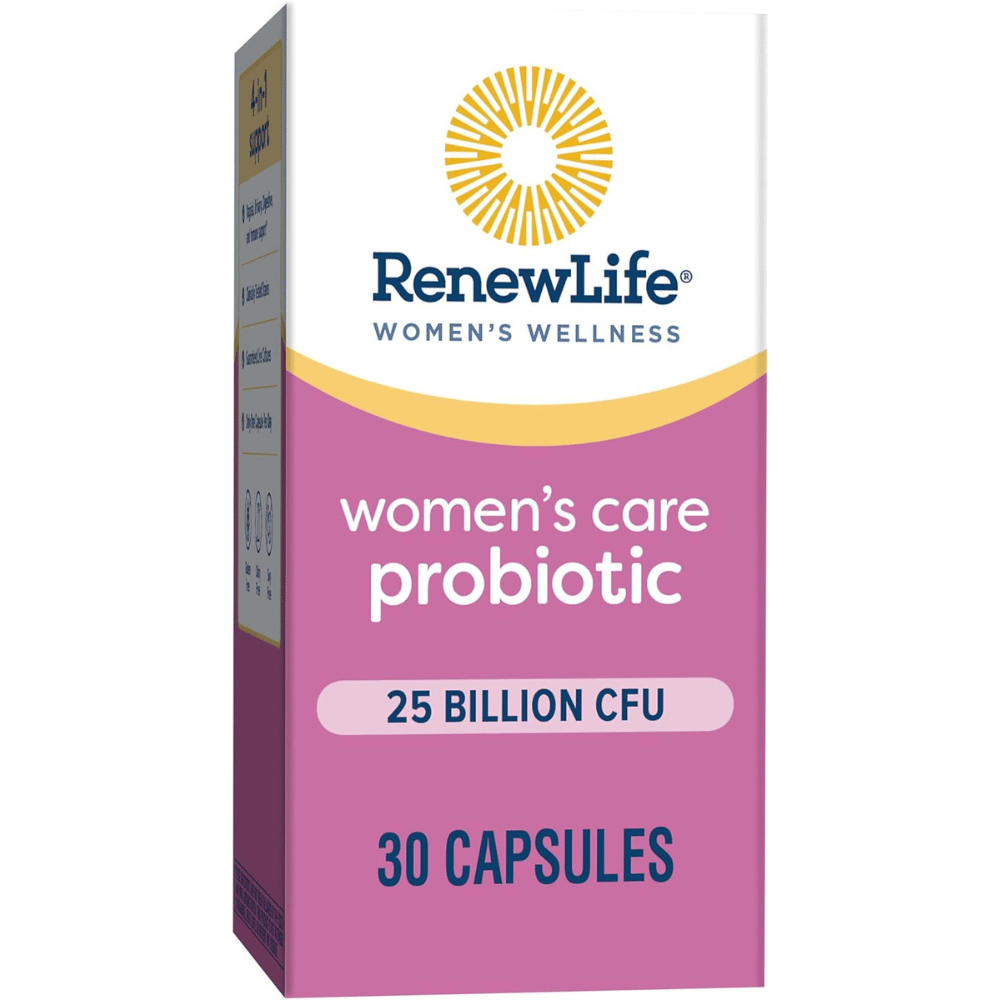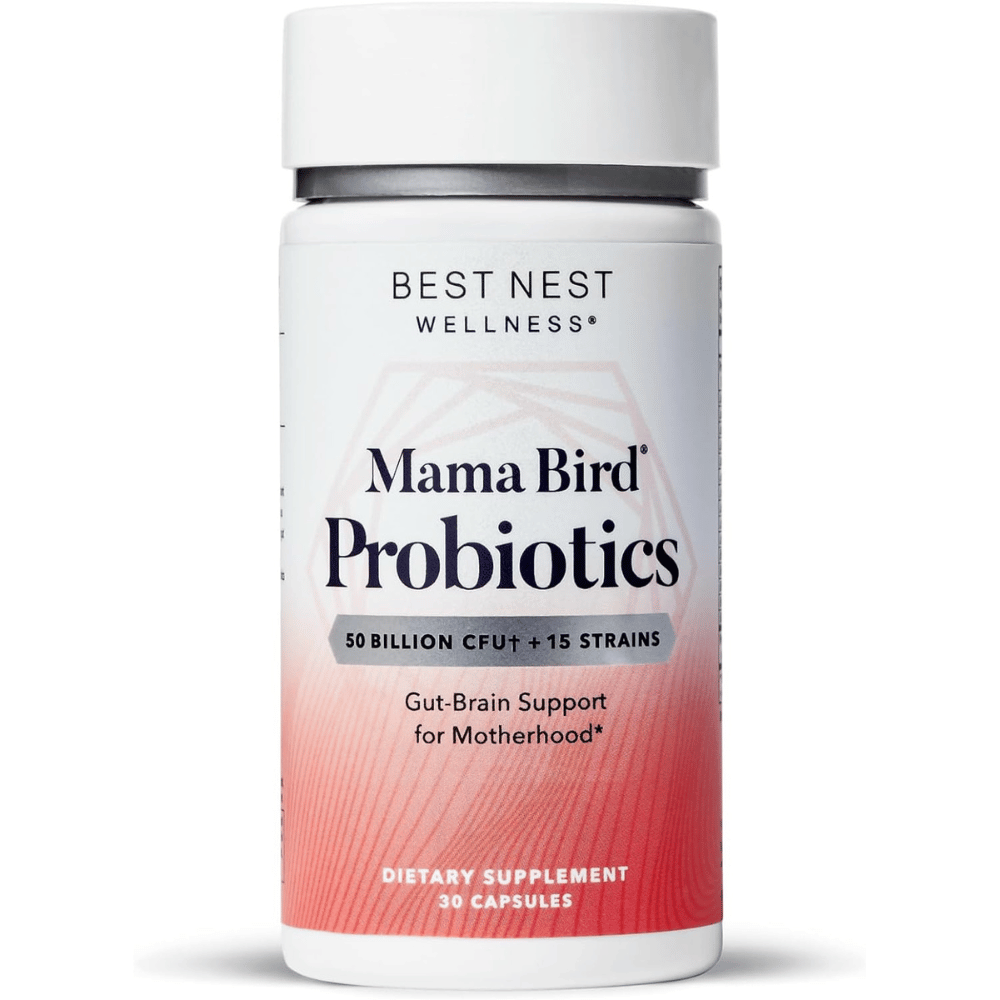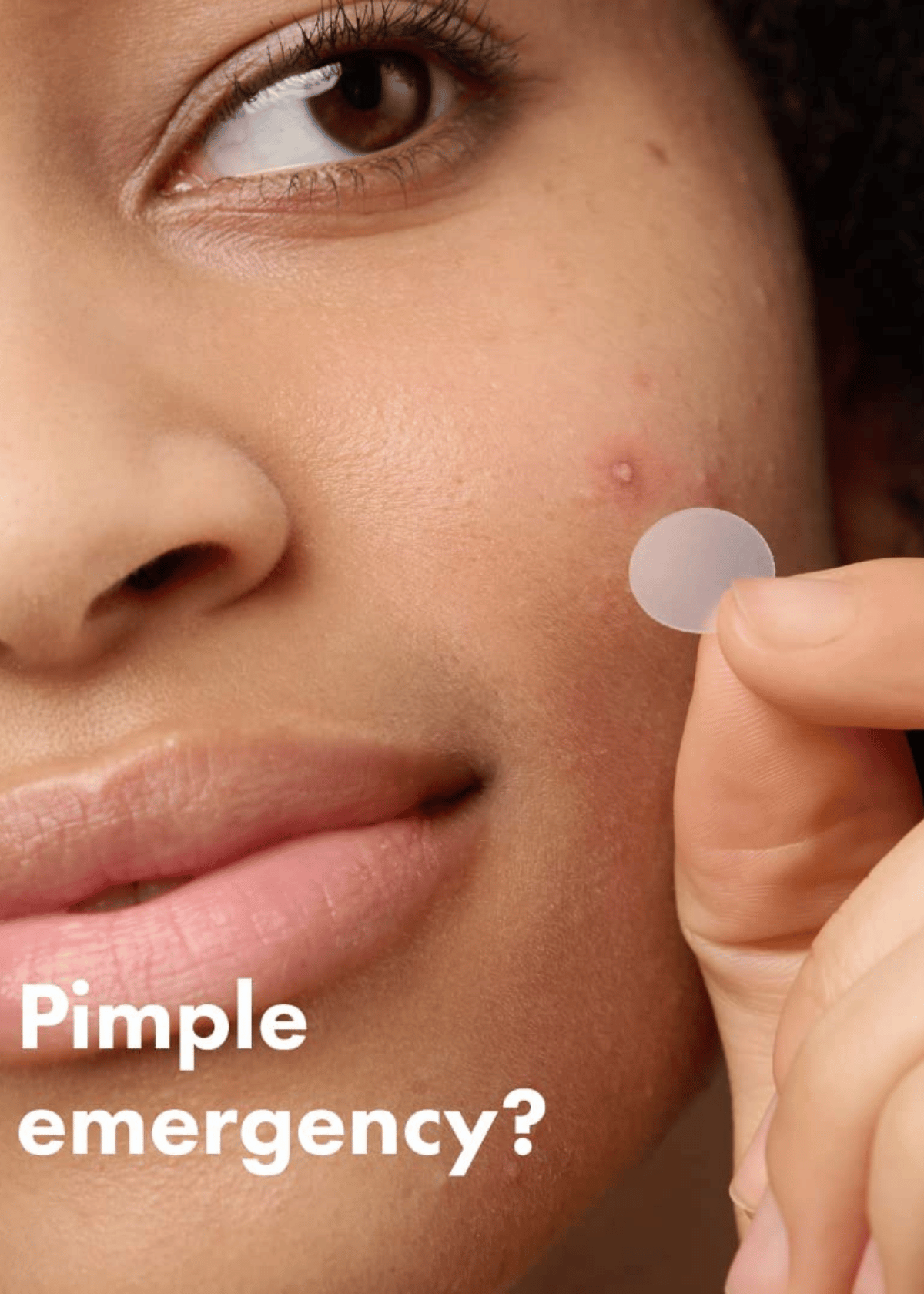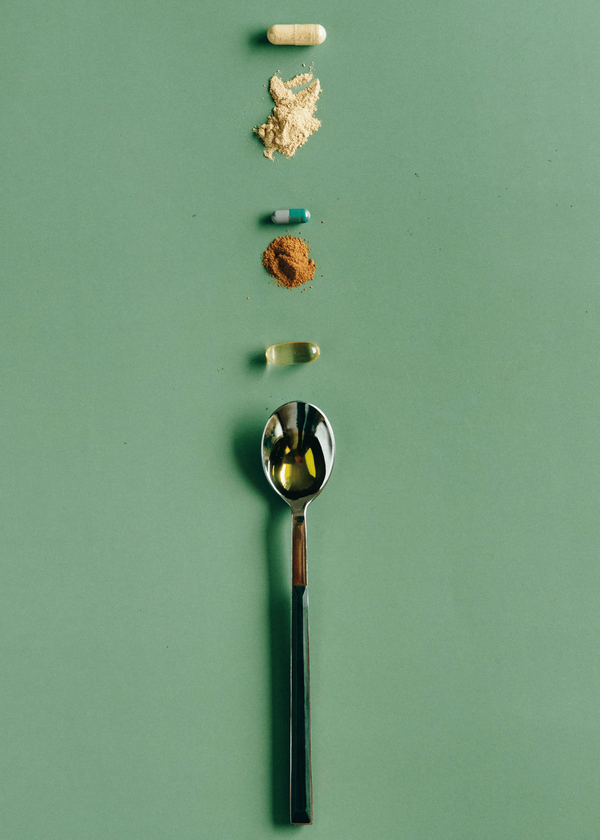Pregnancy is a time of significant change, not just emotionally and physically, but also internally. The gut health of a mother-to-be plays a crucial role in her overall well-being and that of her growing baby. Probiotics, often referred to as the 'good bacteria', have been identified as a key factor in maintaining a healthy balance in the digestive system. But with so many options on the market, what constitutes the best probiotic for pregnancy?
Key Takeaways:
- Identifying the best probiotics for pregnancy involves understanding the specific needs of pregnant women and the role of beneficial bacteria in maternal and fetal health.
- Incorporating probiotic-rich foods and supplements can support the immune system, improve nutrient absorption, and potentially reduce certain pregnancy complications.
- It's essential to choose probiotic strains that are safe and specifically beneficial for pregnancy, such as Lactobacillus rhamnosus, Bifidobacterium lactis, and Lactobacillus acidophilus.
Understanding Probiotics During Pregnancy
During pregnancy, a woman's body undergoes numerous changes, including alterations in the immune function and digestive system. Probiotics during pregnancy can help support these changes by enhancing gut health and contributing to a balanced internal environment. Pregnant women who incorporate probiotics into their diet may experience improved digestive health and a reduced risk of gestational diabetes, vaginal infections, and other health concerns.
Probiotic strains such as Lactobacillus rhamnosus, Bifidobacterium lactis, and Lactobacillus acidophilus are known to be particularly beneficial for pregnant women. These strains not only support a healthy gut but also play a role in nutrient absorption and maintaining a healthy immune system. By taking probiotics, pregnant women can help ensure that their bodies are better equipped to handle the demands of pregnancy and support the development of their babies.
The Role of Probiotics in Maternal and Fetal Health
Probiotics are not just about maintaining a healthy digestive system; they also have a profound impact on maternal and fetal health. A healthy gut flora can help prevent certain pregnancy complications, such as preterm birth and preeclampsia, by maintaining a balanced immune response. Additionally, the beneficial bacteria from probiotics can be passed from mother to child during birth, helping to establish a healthy microbiome for the newborn.
Incorporating probiotic-rich foods and supplements into a prenatal diet can also aid in managing blood sugar levels, which is crucial for preventing gestational diabetes. The potential benefits of probiotics for both mother and child make them an essential component of a healthy pregnancy regimen.
Choosing the Right Probiotic Supplement
When it comes to selecting the best probiotic supplement for pregnancy, it's important to consider the specific strains that are safe and beneficial for expectant mothers. Not all probiotics are created equal, and some may not be suitable for pregnant women. It's advisable to look for prenatal probiotics that contain strains like Lactobacillus rhamnosus, Bifidobacterium lactis, and Lactobacillus acidophilus, which have been studied for their safety and efficacy during pregnancy.
Before starting any new supplement regimen, pregnant women should consult with their healthcare provider. This ensures that the chosen probiotic is appropriate for their individual health needs and that it complements their prenatal vitamins and overall health plan.
Incorporating Probiotic-Rich Foods into Your Diet
In addition to taking probiotics supplements, pregnant women can also benefit from incorporating probiotic-rich foods into their diet. Fermented foods such as yogurt, kefir, sauerkraut, and kimchi are natural sources of beneficial bacteria that can contribute to a healthy gut. These foods not only provide good bacteria but also offer additional nutrients that are important for a healthy pregnancy.
When incorporating probiotic-rich foods into your diet, aim for a variety of options to ensure a diverse intake of beneficial bacteria. Always choose high-quality, unpasteurized products when possible, and consider adding them to a balanced diet that includes plenty of fruits, vegetables, whole grains, and lean proteins.
The Importance of a Balanced Diet During Pregnancy
A balanced diet is the cornerstone of a healthy pregnancy, and incorporating probiotics is just one aspect of achieving this balance. Pregnant women should focus on a diet that provides all the necessary nutrients for both their own health and the development of their baby. This includes a mix of carbohydrates, proteins, healthy fats, vitamins, and minerals.
Probiotics can complement a balanced diet by enhancing digestive health and nutrient absorption. However, they should not be seen as a replacement for a healthy diet. Instead, they should be used as a supportive measure alongside a diet rich in whole foods.
Probiotic Safety and Pregnancy
Safety is a top priority when it comes to taking any supplements during pregnancy, including probiotics. While probiotics are generally considered safe for pregnant women, it's crucial to choose products that are specifically designed for pregnancy. These products have been tested for safety and are less likely to contain strains or ingredients that could pose a risk to maternal or fetal health.
Always read labels carefully and opt for probiotics that have been certified by third-party organizations for quality and safety. If in doubt, consult with a healthcare professional to ensure that the probiotic you choose is safe for you and your baby.
The Impact of Probiotics on Immune Function
The immune system undergoes significant changes during pregnancy to protect both the mother and the developing fetus. Probiotics can play a role in supporting immune function by maintaining a healthy balance of bacteria in the gut. This balance is essential for preventing infections and regulating the body's immune response.
By taking probiotics, pregnant women may help strengthen their immune system, which can be particularly beneficial during pregnancy when they are more susceptible to illness. A strong immune system is also important for the health of the baby, as it can reduce the risk of complications and support healthy development.
When to Start Taking Probiotics During Pregnancy
Deciding when to start taking probiotics during pregnancy is a personal choice that should be made in consultation with a healthcare provider. Some women choose to begin taking probiotics before conception to establish a healthy gut environment, while others may start during pregnancy as part of their prenatal care routine.
It's important to note that the benefits of probiotics can be experienced at any stage of pregnancy. However, starting earlier may provide more time for the beneficial bacteria to colonize the gut and support overall health.
The Top 5 Probiotics For Pregnancy
How We Choose The Best Prenatal Probiotic
Given the vast array of probiotic options on the market, determining the most suitable one for individual needs can be challenging. Our team has conducted extensive research on numerous products to identify the top five prenatal probiotics. This effort is aimed at making the selection process for consumers easier, enabling them to find the appropriate prenatal probiotics without having to guess or waste money on something that won't work.
We hope you find your next best buy from the list below! Each product was independently selected by our editors. BlakesBestBuys may collect a share of sales or other compensation from the links on this page if you decide to buy something (that's how we stay in business). Enjoy finding your next best buy!
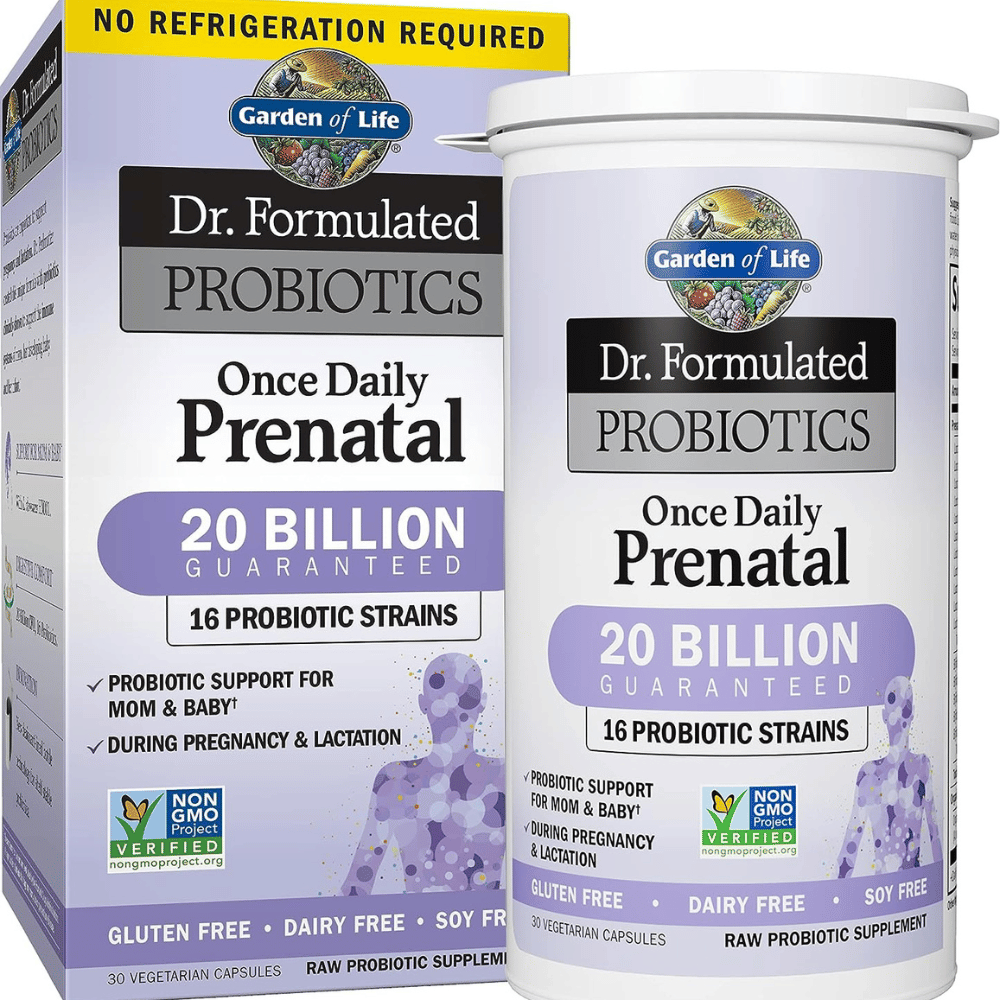
Best Vegetarian Prenatal Probiotic
Garden of Life - Dr. Formulated Probiotics Once Daily Prenatal
What We Love About It
Garden of Life - Dr. Formulated Probiotics Once Daily Prenatal is a simple way to support your health during pregnancy and breastfeeding. It contains 20 billion CFUs and 16 different strains of probiotics, plus prebiotic fiber to nourish them. This includes beneficial Lacto and Bifido strains like B. longum, B. infantis, B. lactis, L. acidophilus, and L. rhamnosus HN001. These have been proven to help both mother and baby's immune systems.
Why Garden of Life - Dr. Formulated Probiotics Once Daily Prenatal Stands Out
Once Daily Prenatal is a simple, allergy-safe supplement that blends probiotics with prebiotics. It contains 115mg of natural prebiotic fiber from potatoes and acacia to promote good gut health. Just one capsule a day is all you need. This supplement stays effective until its expiration date, even in warm shipping conditions. It's also shelf-stable, so you don't have to refrigerate it. All Garden Of Life high-quality products are Non-GMO Project Verified and NSF Certified Gluten-Free.
What We Love About It
Renew Life Women's Care Probiotic is the #1 selling women's probiotic. Formulated by probiotic experts, Renew Life Women's Care contains strains supported by 25 years of women's clinical research. Just one capsule per day promotes digestive, urinary, and immune health. Additionally, their formula includes the top three probiotic strains known to be particularly beneficial for pregnant women.
Why Renew Life Women’s Care Probiotic Stands Out
Renew Life probiotics, developed by specialists such as neuroscientists and chemists, offer clinically validated strains. They guarantee 100% live cultures up to the expiration date for reliable efficacy. The Women’s Care Probiotic provides 25 billion CFU per capsule from 12 strains, featuring the most researched strains, and is free from gluten, dairy, and soy.
What We Love About It
Mama Bird Probiotics by Best Nest Wellness are packed with over 50 billion CFUs and 15 diverse probiotic strains, these supplements are designed to nurture your gut-brain link, especially during pregnancy. They help maintain a healthy digestive system and regular bowel movements, while also aiding in the creation of serotonin, a mood-enhancing chemical in your brain.
Why Best Nest Wellness Mama Bird Probiotics Stands Out
Their time-delayed, acid-resistant capsule is designed to withstand digestive acids, ensuring that the probiotic strains arrive safely in your lower gut where they can be most effective. This convenient daily probiotic for women features a once-daily formula that's simple to remember—just one mini, small, and easy-to-swallow capsule per serving. It's free of GMOs, gluten, and dairy, and proudly made in the U.S.A. Each batch is verified by a third-party ISO/IEC 17025 accredited lab to support the concentration of active ingredients, confirm low heavy metals concentrations, and ensure purity.
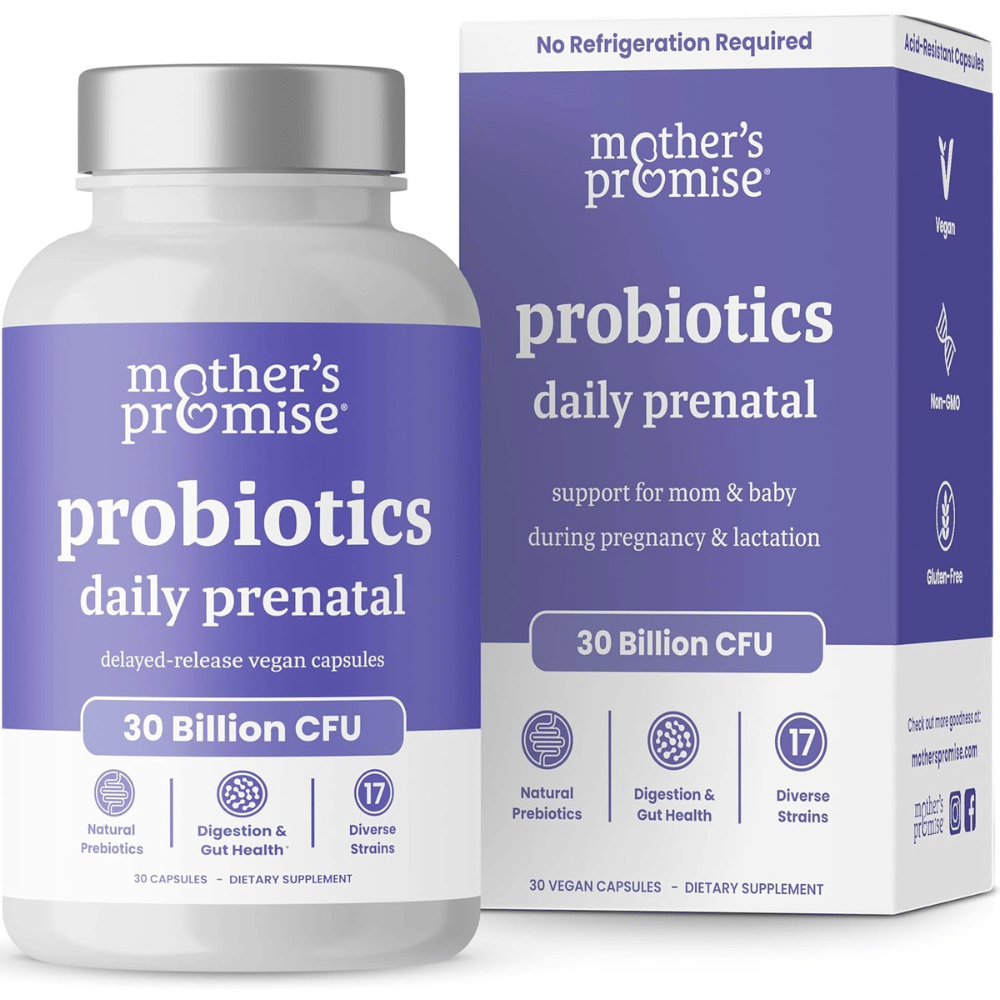
Best Prenatal Immune Health Probiotic
Mothers Promise Probiotics Daily Prenatal
What We Love About It
Mothers Promise Probiotics are designed for women's health and digestion during pregnancy and nursing. One small capsule contains 17 different probiotic strains and 30 billion CFUs, plus organic prebiotics. This blend is made to give you and your baby the care you deserve.
Why Mothers Promise Probiotics Daily Prenatal Stands Out
Mother’s Promise probiotics are engineered for maximum survival through the digestive system, thanks to acid-resistant capsules and a potent 30 Billion CFU count. No need for refrigeration.
The women's prenatal blend features 17 diverse strains, including Bifidobacterium lactis, Lactobacillus acidophilus, Lactobacillus rhamnosus, Bacillus subtilis, and Lactobacillus paracasei, to promote urinary tract health and alleviate common digestive discomforts like constipation, diarrhea, and bloating.
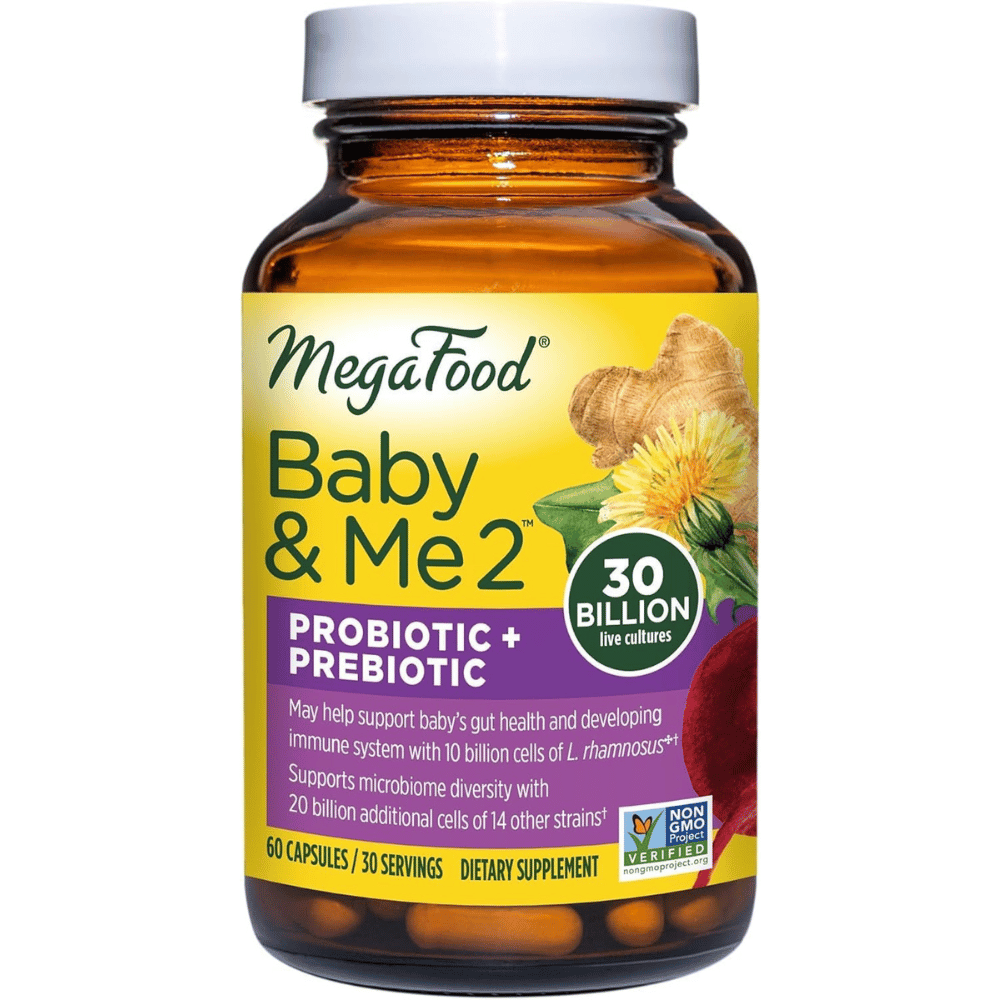
Best Gluten Free Prenatal Probiotic
MegaFood Baby & Me 2 Prenatal Probiotic + Prebiotic
What We Love About It
MegaFood Baby & Me 2 Prenatal supplement combines probiotics and prebiotics to support the health of pregnant mothers and their developing babies. It is certified vegan and Non-GMO, and has been tested for over 125 chemical substances. This product is made without nine common allergens: milk, eggs, peanuts, tree nuts, soy, wheat, fish, shellfish, and sesame, ensuring it is gluten-free.
Why MegaFood Baby & Me 2 Prenatal Probiotic + Prebiotic Stands Out
Each serving contains 30 Billion CFU: 10 billion cells of Lactobacillus rhamnosus which may help support baby’s gut health and developing immune system in the last trimester and early breastfeeding, plus 20 billion additional cells of 14 other strains of active bacteria including Lactobacillus acidophilus and Bifidobacterium lactis.
Summary
Choosing the best probiotic for pregnancy involves understanding the unique needs of pregnant women and the role of beneficial bacteria in supporting a healthy pregnancy. Probiotics can enhance gut health, support immune function, improve nutrient absorption, and potentially reduce the risk of certain pregnancy complications. Pregnant women should look for probiotic strains that are safe and specifically beneficial, such as Lactobacillus rhamnosus and Lactobacillus acidophilus, and consider incorporating probiotic-rich foods into a balanced diet. Always consult with a healthcare provider before starting any new supplement regimen to ensure safety and appropriateness for your individual health needs.
FAQ'S
Are all probiotics safe to take during pregnancy?
Not all probiotics are created equal, and some may not be suitable for pregnant women. It's important to choose probiotic strains that are safe and specifically beneficial for pregnancy. Always consult with a healthcare provider before starting any new supplement regimen.
Can taking probiotics during pregnancy help with digestive issues?
Yes, probiotics can help support the digestive system during pregnancy by maintaining a healthy balance of gut bacteria. This can lead to improved digestion and may help alleviate common digestive issues experienced by pregnant women.
Should probiotics be taken in addition to prenatal vitamins?
Probiotics can be a beneficial addition to prenatal vitamins, as they support gut health and can enhance nutrient absorption. However, they should not replace a balanced diet and prenatal care. Always discuss any new supplements with your healthcare provider to ensure they fit into your overall health plan.
Can you get pregnant while taking probiotics?
Taking well-researched probiotics to support both gut health, and intimate health could eliminate several 'barriers' to fertility and increase our changes of conceiving and maintaining a pregnancy.
Can I take prenatal vitamins and probiotics together?
Moms-to-be often wonder if they can take both prenatal vitamins and probiotics together. The answer is: Yes, it is safe to take both types of supplements together. Probiotics are beneficial bacteria and yeasts that live in the digestive tract, helping to keep the digestive system healthy.
When should I start taking probiotics during pregnancy?
A meta-analysis and systematic review of 8 randomized control trials of probiotic use in more than 1500 pregnant women was published. Most of the women began probiotic treatment between 32 and 36 weeks' gestation and continued until delivery.
Is it better to take probiotics in the morning or at night?
Generally, the best time of day to take probiotics is with breakfast, or just after. It's equally important to take probiotics at a convenient time for you so you don't forget. Different probiotic strains behave differently.


